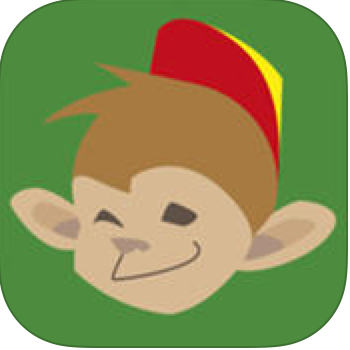Thanks to Birgit Aschemann, she presented the concept and the idea of our MOOC during a conference of the european union. Therefore she translated our introduction video:
[master] Adaptives Informationssystem zur Erlernung mehrstelliger Divsion
Gerald Geier hat seine Diplomarbeit mit deren Verteidigung erfolgreich abgeschlossen. Zu unserer Freude sind damit alle vier Grundrechnungsarten nun unter https://schule.learninglab.tugraz.at verfügbar. Dazu ein andermal mehr, hier einmal seine Folien:
Klicken Sie auf den unteren Button, um den Inhalt von prezi.com zu laden.
[iphone] TUKey – Secure Password Manager #iphone #app
 Im Rahmen unserer Vorlesung “Mobile Applications 2015” wurde auch ein Passwortmanager fürs iPhone entwickelt – nicht uninteressant für den alltäglichen Gebrauch:
Im Rahmen unserer Vorlesung “Mobile Applications 2015” wurde auch ein Passwortmanager fürs iPhone entwickelt – nicht uninteressant für den alltäglichen Gebrauch:
TUKey saves your login informations in an easy and secure way. You choose one master key to access all your credentials. The data is stored encrypted on your device and can be synchronized via iCloud with all your devices. TUKey allows you to generate secure passwords and store them. Your stored data can only be accessed using the master key.
The TUKey Safari extension allows you to retrieve your stored credentials and fills them in.
FEATURES:
- Free and secure password manager
- Data gets encrypted and is stored on your device
- Password generator for creating secure passwords
- Safari extension to easily access your login information – iCloud synchronization between your devices
- One master key for all devices
This application has been developed for the “Mobile Applications” lecture at the Graz University of Technology.
Die Maker Days for Kids – Präsentationsunterlagen von der MAKE Hannover #makerdays
Martin Schön und Mathias Wunderlich haben auf der MAKE Hannover das Projekt “Maker Days for Kids” präsentiert und unsere Erfahrungen damit vorgestellt. Hier die Präsentationsunterlagen:
Klicken Sie auf den unteren Button, um den Inhalt von de.slideshare.net zu laden.
Jahresbericht BIMS e.V. #bims
Gerade noch im ersten Halbjahr 2015 ist er online gegangen (und beim BIMS e.V. als Print erhältlich): Der Jahresbericht 2014 des BIMS e.V. wo ich auch im Vorstand schon nun mehrere Jahre tätig bin und spannende Projekte umsetzen und begleiten darf.
Klicken Sie auf den unteren Button, um den Inhalt von de.slideshare.net zu laden.
[publication] Impacts of Interactions in Learning-Videos: A Subjective and Objective Analysis #tugraz
Our publication at this year ED-Media 2015 conference “Impacts of Interactions in Learning-Videos: A Subjective and Objective Analysis” is now online available. You can find the described information system LIVE right here.
Abstract:
It is clear that a system known as selective attention is the most crucial resource for human learning (Heinze et al. 1994). Due to this fact a web based information system is developed to support the attention of the watchers of a learning video. This is done by enriching the video with different forms of interactions. Among others there are interactions presenting multiple-choice questions at predefined positions in the video as well as randomly occurring interactions displaying general questions, which are not content related. To gain a basic plan which points out how to distribute the interactions over the video the usage of the information system at a lecture is analyzed. For that on the one hand some feedback of the users is provided and on the other hand an objective analysis of the results of the multiple-choice questions is done by evaluating their time of occurrence in the video.
Reference: Wachtler, J., Ebner, M. (2015). Impacts of Interactions in Learning-Videos: A Subjective and Objective Analysis. In Proceedings of World Conference on Educational Multimedia, Hypermedia and Telecommunications 2015. pp. 1205-1213 Chesapeake, VA: AACE.
[presentation] Learning Analytics in Massive Open Online Courses #LearningAnalytics
Stephan did his masterthesis about “Learning Analaytics in Massive Open Online Courses” and developed a first prototype for in-depth analyses. Here you can find his slides of his defense:
Klicken Sie auf den unteren Button, um den Inhalt von de.slideshare.net zu laden.
[publication] Erfolgsfaktoren für Projekte zu offenen Bildungsressourcen – Bücher gehen auf die Reise :-) #OER #O3R #L3T #bims
Wir sind ja reichlich altmodisch, und bieten unsere Veröffentlichung sehr oft auch gedruckt an. Soeben wurden die Exemplare des neuen Bandes der O3R-Reihe für die beteiligten Experten für den Versand gepackt 🙂
 Martina Stadler hat eine interessante Masterarbeit mit dem Titel “Was macht OER-Projekte erfolgreich? Eine Analyse von Erfolgsfaktoren von Projekten zu offenen Bildungsressourcen (OER) im schulischen Kontext” verfasst und stellt diese der Reihe zur Verfügung:
Martina Stadler hat eine interessante Masterarbeit mit dem Titel “Was macht OER-Projekte erfolgreich? Eine Analyse von Erfolgsfaktoren von Projekten zu offenen Bildungsressourcen (OER) im schulischen Kontext” verfasst und stellt diese der Reihe zur Verfügung:
Es gibt zahlreiche, meist ehrenamtlich verfolgte Initiativen, die offene Bildungsressourcen (auf Englisch „open educational resources“, kurz OER) erstellen. Dieser 9. Band der O3R-Reihe beschäftigt sich mit den Faktoren, die gegeben sein müssen, damit OER-Projekte erfolgreich sind und Lehrerinnen und Lehrer an diesen aktiv mitmachen. Dazu wurde das Online-Angebot von fünf erfolgreichen OER-Projekten aus Österreich und Deutschland mit Hilfe eines eigens entwickelten Kriterienkatalogs analysiert und mit Hilfe von problemzentrierter Interviews die Projektbesonderheiten und projektspezifischen Erfolge aus Anbietersicht eruiert. Die Ergebnisse aus dem Theorieteil und dem empirischen Teil werden abschließend reflektiert und zusammengeführt. Zusammenfassend kann festgehalten werden, dass OER-Projekte dann erfolgreich sind, wenn die aktive Mitarbeit einfach und unkompliziert möglich ist. Weitere Faktoren, die zum Gelingen eines OER-Projektes beitragen sind unter anderem der Bekanntheitsgrad der Initiative, die gesicherte Projektfinanzierung und eine Qualitätskontrolle der Beiträge. Einflussgrößen, damit Pädagoginnen und Pädagogen ihren Content teilen, sind neben den oben genannten Faktoren persönliche Anreize, wie die bewusste Beteiligung an sozialen Projekten, der eigene Reputationsgewinn oder die Kommunikation und der Austausch mit gleichgesinnten Kolleginnen und Kollegen.
Das Buch kann bei Amazon bestellt werden oder ist als .pdf wie gewohnt auf der Homepage zugänglich.
Zitation: Stadler, M. (2015) Was macht OER-Projekte erfolgreich? Eine Analyse von Erfolgsfaktoren von Projekten zu offenen Bildungsressourcen (OER) im schulischen Kontext. Ebner, M., Schön, S. (Hrsg.), Band 9, O3R-Reihe, Book On Demand, Norderstedt
[publication] Why Facebook Swallowed WhatsApp! #tugraz
Our publication at this year ED-Media 2015 conference “Why Facebook Swallowed WhatsApp!” is now online available.
Abstract:
Since 2007 Graz University of Technology has undertaken questionnaires on its first- year students. The main goal of that annual survey basically concentrates on the IT- and Web- competences as long as they are related to e-learning. The long-term results display progresses and trends that need to be taken into account for a university’s e-learning strategy. The results of this year mainly state a tremendous triumph of the application WhatsApp. It ́s influence on the usage of other applications and it’s relation to Facebook is specially focused. There is no evidence that using WhatsApp has a negative effect on Facebook. Quite the contrary; WhatsApp is another big push on the steady growing usage of modern media for learning purposes.
Reference: Nagler, W., Ebner, M., Schön, M. (2015). Why Facebook Swallowed WhatsApp!. In Proceedings of World Conference on Educational Multimedia, Hypermedia and Telecommunications 2015. pp. 1383-1392 Chesapeake, VA: AACE.
Klicken Sie auf den unteren Button, um den Inhalt von pinpoll.com zu laden.
[iphone] Slap The Clap
 Im Rahmen unserer Vorlesung “Mobile Applications 2015” ist ein Spiel entwickelt worden um den Rythmus zu üben:
Im Rahmen unserer Vorlesung “Mobile Applications 2015” ist ein Spiel entwickelt worden um den Rythmus zu üben:
The rhythm or clapping therapy is used for people with special needs: For children with attention deficit hyperactivity disorder it is successfully applied to help them in improving their concentration and motor planning skills. In retirement homes it is used to support the elderly people with keeping their motor and coordination skills. Moreover, in rehabilitation, e.g. after an accident, a stroke, or a heart attack, the rhythm therapy can cure movement disorders and paralysis.
In this therapy the patient tries to clap or knock various specific rhythms after a coach as exactly as possible. If the patient manages to clap the rhythms correctly, more complex rhythms are chosen. As this training always requires a therapist, however, it is very expensive.
This app was developed to enable patients to practice the rhythmic clapping on their own. It generates and plays various rhythms by random. After playing one rhythm, the app asks the patient to clap the rhythm and records the sound for the next seconds. When the recording has finished, the app analyses it and determines if the rhythm clapped by the patient is similar to the played one. If so, the patient gets positive feedback, the next rhythm is generated, and the procedure begins again. If the rhythms are not similar, the app repeats the same rhythm, asking the patient to try it another time. Once the patient has managed to clap a series of 9 different rhythms correctly this way, rhythms of higher complexity, i.e. of longer duration, higher tempo, and/or smaller values of the notes, are generated.
The app was designed mainly with children in mind: It looks like a game, consisting of 9 levels, where each level corresponds to a different degree of rhythm complexity. A colorful graphical user interface and the sometimes barefaced character of a monkey, acting as a personal, very musical clapping coach and giving funny feedback, motivate the children to practice. In the Pro Version which will be released in autumn 2015, besides other new features, there will be the possibility to win different parts of a drumset as achievements for good performances for additional motivation to work with the system.
It is important to underline that this app should not completely replace a therapist, since the personal interaction between the therapist and the patient is very important. The app should rather be regarded as an addition to the personal rhythm therapy, giving the children extra motivation and the possibility to practice independently between the therapy sessions. This way, the app shall contribute to a higher spread of the rhythm therapy.


